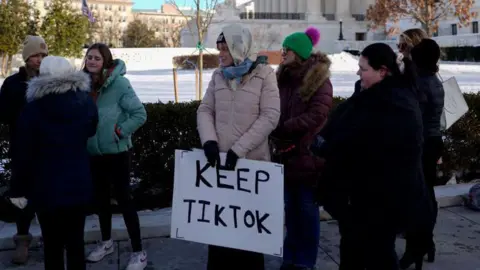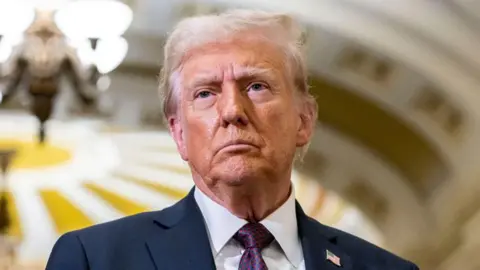 Getty Images
Getty ImagesTikTok will be banned in the US on January 19 – unless the Supreme Court accepts a ruling last legal offer of its Chinese owner, ByteDance, that doing so would be unconstitutional.
But even if the nation’s highest court agreed with lower courts — and Congress — that the platform poses a threat to national security, will that actually stop Americans from using it? ?
Will there be ways around the ban — or could President-elect Donald Trump find a way to block a law he says he opposes, even if the courts uphold it.
And whatever happens to TikTok, who benefits from the uncertainty that clouds its future?
Can people still use TikTok even if it’s banned?
The most likely way for the United States to ban TikTok would be to order app stores, such as the Google Play Store and Apple’s App Store, to make it unavailable for download in that region.
US lawmakers have already asked tech companies to be prepared to remove the app from their stores if a ban comes into effect.
This would mean that people would no longer be able to use a legitimate way to access TikTok – but it would also mean that people who already have it would still have it on their phone.
Since the app would no longer be available to the public, new updates could no longer be provided to users in the United States, making the app more buggy and ultimately unusable.
Not to mention, many updates are provided to fix app security vulnerabilities, so if TikTok stopped receiving updates, it could present hackers with millions of devices to target.
 Getty Images
Getty ImagesOf course, there are ways to circumvent such a ban.
There are already plenty of videos circulating on TikTok telling users how to use a VPN (virtual private network) – a way to make it appear like you’re in another region.
The app stores region can also be changed on most devices, so anyone can theoretically access apps from other countries – although this could lead to other issues, not to mention likely breaking conditions of service.
It is also possible to install applications downloaded from the Internet by modifying a device – which may violate copyright law – and carries its own risks. However, the government has also anticipated this and is also proposing to ban “internet hosting services” from giving people access to the app.
So if the ban takes this kind of form, it seems likely that those determined to use TikTok after it comes into force will be able to do so – but it won’t be the experience they’re used to.
How else could TikTok be banned?
The government still has other avenues in the future – for example, after India banned TikTok in 2020, it ordered internet providers to completely block access to the app.
And even if people were using a VPN, TikTok could theoretically determine if a person is based in the United States and then simply present them with a screen saying the app isn’t available in their country.
It remains to be seen whether TikTok would decide to help the government with its own ban – but Reuters reports that it is considering doing so.
TikTok’s own lawyer told the Supreme Court he believes the app will “go dark” in the US unless it rules in its favor.
The complexity of the issue means that even experts don’t know exactly what will happen next.
Professor Milton L. Mueller of the Georgia Institute of Technology — who filed a legal brief in support of TikTok — said the lack of clarity about how far the United States could extend its authority to enforce the law made it difficult to know what would technically happen if a ban were implemented. difficult to determine.
But he said what was clear was the impact it would have on users and the Internet itself.
“It would totally legitimize the fragmentation of the Internet along national or jurisdictional borders,” he said.
Will Trump still be able to intervene?
 Getty Images
Getty ImagesTrump has made clear he does not want the law to take effect, asking the Supreme Court to delay its implementation while he seeks a “political solution.”
But if the judges confirm it, Trump does not have the power to overturn the law, which would take effect the day before he returns to power.
But he could just tell the Justice Department not to enforce it.
The government would effectively tell Apple and Google that they won’t be punished for continuing to allow access to TikTok, meaning the law would remain in effect but would essentially be redundant.
Clearly, businesses might be uncomfortable with breaking the law even if they’ve been told everything is fine – because that would effectively require them to take the president’s word that they won’t be not punished.
What platforms could people turn to instead?
TikTok claims to have 170 million users in the United States who spent an average of 51 minutes per day on the app in 2024.
Banning TikTok or making it less usable creates a huge opportunity for its big tech rivals, says Insider Intelligence analyst Jasmine Enberg.
“Google-owned Instagram Reels and YouTube Shorts are the most natural solutions for displaced users, creators and advertisers,” she says.
Facebook could also benefit, although Ms. Enberg says, like all Meta platforms, controversial political changes announced by boss Mark Zuckerberg could potentially diminish its appeal.
Users bring advertisers – so a ban could be a big financial boost for these platforms.
“The CMOs we spoke with confirmed they would divert their media dollars to Meta and Google if they could no longer advertise on TikTok – this is the same behavior we saw in India when they banned TikTok in 2020,” Forrester said. senior analyst Kelsey Chickering.
Lemon8, which is also owned by ByteDance, would have been an obvious place for people to follow a ban – but the law states that this also applies to other apps owned or operated by the company. This means that Lemon8 will likely be made inaccessible in the United States as well.
Other potential winners include Twitch, which has made its name hosting live streams, a popular feature on TikTok. Twitch is well known especially among gamers, although it continues to grow with other content.
Other Chinese platforms, like Xiaohongshu – known as RedNote among its US users – has seen rapid growth in the US and UK.
Still, some suggest that no existing app can truly replace TikTok, particularly its TikTok Shop feature, which lets users buy products directly from videos and makes big money for U.S. creators.
Craig Atkinson, CEO of digital marketing agency Code3, says there are no direct competitors that people could easily turn to – and notes that his agency is signing new contracts with clients to create TikTok campaigns Shop in December.
Could a new buyer still emerge?
 Getty Images
Getty ImagesSo far, ByteDance has been resolute that no sale of its award-winning US asset will be considered.
But could that change if it were actually banned – and when a president who prided himself on the “art of the deal” returned to the White House?
Potential buyers continue to queue – with Bloomberg News reported Tuesday that the company was considering a sale to billionaire Elon Musk, although TikTok has since described this as “pure fiction”.
Former Trump Treasury Secretary Steven Mnuchin and billionaire businessman Frank McCourt are among those who have already expressed interest in purchasing.
Mr. McCourt, a former owner of the Los Angeles Dodgers baseball team, said he had secured $20 billion in verbal commitments from a consortium of investors to bid on TikTok.
There is an even more marginal – and considerably less serious – proposed owner.
The biggest YouTuber in the world MrBeast claimed he was now in the running to strike a deal after billionaires contacted him about it.
While it may seem like a joke, he has a significant financial incentive to try to save the app: MrBeast has more than 100 million followers on TikTok.



